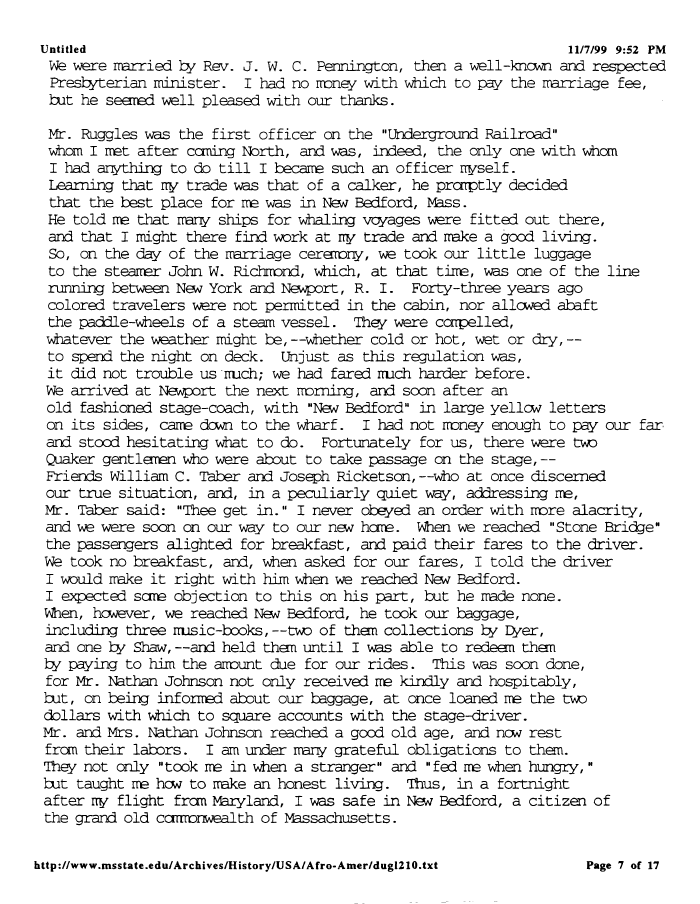 |
||||
|
TASK FORCE TO STUDY THE HISTORY AND LEGACY OF SLAVERY IN MARYLAND (Final Report) 1999/12/31 MdHR 991422 MdHR 991422, Image No: 401 Print image (112K) |
 |
||||
|
TASK FORCE TO STUDY THE HISTORY AND LEGACY OF SLAVERY IN MARYLAND (Final Report) 1999/12/31 MdHR 991422 MdHR 991422, Image No: 401 Print image (112K) |
| Untitled 11/7/99 9:52 PM We were married ky Rev. J. W. C. Pennington, then a well-kncwn and respected Presbyterian minister. I had no money with which to pay the marriage fee, but he seared well pleased with our thanks. Mr. Haggles was the first officer on the "Underground Railroad" whom I met after ccming North, and was, indeed, the only one with whom I had anything to do till I became such an officer rryself. Learning that ny trade was that of a calker, he protptly decided that the best place for me was in Nav Bedford, lyfess. He told ire that many ships for whaling voyages were fitted out there, and that I might there find work at ny trade and rake a good living. So, on the day of the marriage ceronony, we took our little luggage to the steamer John W. Richmond, vMch, at that time, was one of the line running between New York and Newport, R. I. Forty-three years ago colored travelers were not permitted in the cabin, nor allcwed abaft the paddle-wheels of a steam vessel. They were corpelled, whatever the weather might be,—whether cold or hot, wet or dry,— to spend the night on deck. Unjust as this regulation was, it did not trouble us 'iruch; we had fared rruch harder before. We arrived at Newport the next morning, and soon after an old fashioned stage-coach, with "New Bedford" in large yellcw letters on its sides, came dcwn to the wharf. I had not money enough to pay our far and stood hesitating what to do. Fortunately for us, there were two Quaker gentlanen who were about to take passage on the stage, — Friends William C. Taber and Joseph Ricketson,—who at once discerned our true situation, and, in a peculiarly quiet way, addressing ire, Mr. Taber said: '"Thee get in." I never obeyed an order with more alacrity, and we were soon on our way to our new hone. When we reached "Stone Bridge" the passengers alighted for breakfast, and paid their fares to the driver. We took no breakfast, and, when asked for our fares, I told the driver I would rake it right with him when we reached New Bedford. I expected sane objection to this on his part, but he made none. When, hcwever, we reached New Bedford, he took our baggage, including three irusic-books,—two of them collections ty Eyer, and one ky Shaw, —and held then until I was able to redean than ty paying to him the amount due for our rides. This was soon done, for Mr. Nathan Johnson not only received me kindly and hospitably, but, on being informed about our baggage, at once loaned me the two dollars with which to square accounts with the stage-driver. Mr. and Mrs. Nathan Johnson reached a good old age, and now rest from their labors. I am under many grateful obligations to than. They not only "took me in when a stranger" and "fed ire when hungry," but taught me how to make an honest living. Thus, in a fortnight after rry flight from ivferyland, I was safe in New Bedford, a citizen of the grand old ccmnnonwealth of Massachusetts. http://www.msstate.edu/Archives/History/USA/Afro-Amer/dugl210.txt Page 7 of 17 |